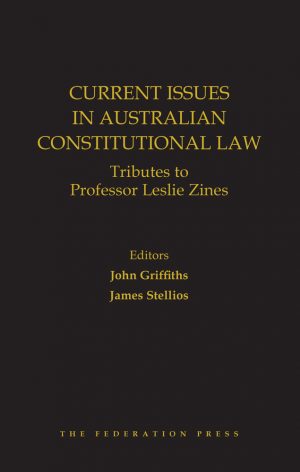Statutory interpretation — the law governing the determination of the meaning and effect of legislation — is a major area of law. Indeed, with the rise of legislation as a source of law, it has come to dominate legal practice. Yet statutory interpretation has sometimes been derided by commentators. Is this criticism fair? Is the law in a state of disrepair? Or have its strengths and its inherent limitations been overlooked? This book critically examines, from multiple perspectives, the coherence of the principles and practice of statutory interpretation. The main questions it addresses are: is the law coherent and if so, what are those respects? And if in certain respects it is not coherent, how and why has this come about?
Specifically, the book examines whether statutory interpretation has constitutional foundations and whether these lend coherence. It explores whether legislative drafting can anticipate statutory interpretation and whether this background aids coherence. It asks whether statutory interpretation has a coherent overall method. And it examines several important aspects of statutory interpretation to see whether reliance on them aids coherence. These aspects include the text of legislation, and whether it limits the judicial role; the presumption that Parliament intends the legislative purpose be promoted; Acts Interpretation Acts; and objects provisions.
The contributions to the collection are written by distinguished commentators with expertise in statutory interpretation, including judges, barristers, Crown Counsel, parliamentary counsel, and academics.
Examining coherence has the potential to bring significant benefits to the law and the wider community. To the extent the law of interpretation is found to be coherent, the examination increases the confidence in the judiciary and the administration of the law. To the extent it is not coherent, it produces material for consideration as to its improvement.
Preface
About the Contributors
Table of Cases
Table of Statutes
PART I – Introduction
1. Opening Remarks
The Honourable Kenneth Hayne AC
PART II – Constitutional Perspectives
2. Constitutional Principles and Coherence in Statutory Interpretation
Justice Nye Perram
3. Division of Constitutional Power and Responsibilities and Coherence in the Interpretation of Statutes
Guy Aitken
4. The Coherence of Statutory Interpretation: A Commentary
Sir Anthony Mason AC KBE GBM QC
PART III – Drafting Perspectives
5. The Coherence of Statutory Interpretation: Drafting Perspectives
Eamonn Moran PSM QC
6. Judges v Drafters: The Saga Continues
Helen Xanthaki
7. The Coherence of Statutory Interpretation: Commentary
Daniel Greenberg
PART IV – Overall Method
8. Is there an Overall Method to Interpreting Legislation?
Jeffrey Barnes
9. Indefinite Terms and Broad Discretions: Statutory Interpretation Against an ‘Infinite Variety of Facts’
Justice Timothy Ginnane
PART V – The Text and the Limits of the Judicial Role
10. The Quest for Certainty and the Limits of the Judicial Role
Justice Chris Maxwell
11. Certainty, Choice and Text in Statutory Interpretation
Jacinta Dharmananda
PART VI – The Legislative Purpose
12. Legislative Purpose and Statutory Interpretation
John Basten
PART VII – Acts Interpretation Acts
13. Interpretation Acts: Coherent Interpretation and a Coherent Statute Book
Nick Horn
PART VIII – Objects Provisions
14. Are Objects Provisions Valuable to Primary Decision-Makers? The Case of Australia’s National Disability Insurance Scheme
Darren O’Donovan and Narelle Bedford
PART IX – Administrative Law
15. Administrative Law and Statutory Interpretation: Sidesteps and Missteps in the Struggle for Coherence
Matthew Groves
PART X – Conclusion
16. Closing Reflections
Steven Churches
Bibliography
Index
Jeffrey Barnes is to be congratulated for editing and producing a very interesting collection of papers, originally presented at a conference in 2016, on the coherence of the principles of statutory interpretation. The authors are experienced judges, academics and parliamentary counsel, who provide a thoughtprovoking variety of perspectives.
Jeffrey Goldsworthy AM, (2020) 31 Public Law Review, 212
The essays collected in The Coherence of Statutory Interpretation do much to guide us, in the Honourable Kenneth Hayne AC’s words, along a path at the end of which there is, after all, only one meaning.
Stephen Puttick, (2020) 94 ALJ 640







